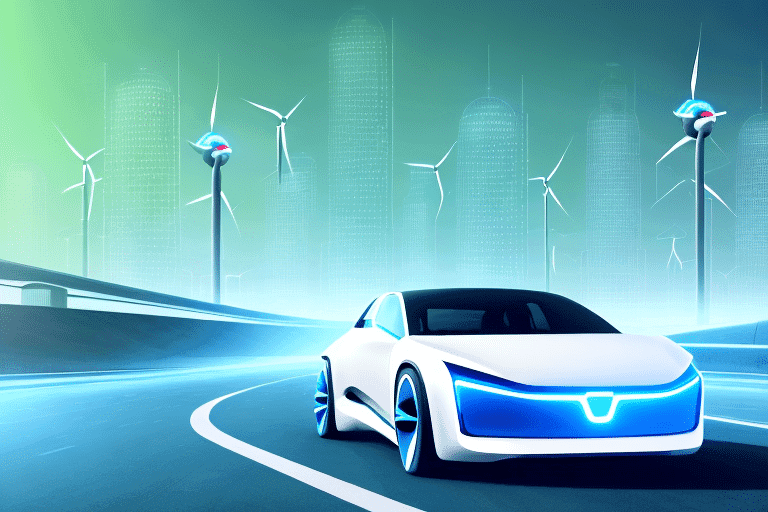UPDATED: March 17, 2024
Men, listen up! The future of transportation is here, and it's electric! If you've been curious about electric vehicles (EVs) but aren't quite sure where to start, this article is for you. We'll cover everything you need to know about EVs, from the basics to the cutting-edge technology shaping their future. So buckle up and let's dive in!
Understanding Electric Vehicles
The Basics of Electric Vehicles
First things first, let's get familiar with the basics of EVs. Unlike traditional vehicles that run on gasoline or diesel, electric vehicles are powered by rechargeable batteries. These batteries provide the energy needed to propel the vehicle forward. Say goodbye to trips to the gas station and hello to plugging in at home or at public charging stations!
One key advantage of electric vehicles is their incredible efficiency. EVs convert about 59-62% of the electrical energy from the grid to power at the wheels, while traditional vehicles only achieve around 17-21% efficiency. This means that electric vehicles go further on the same amount of energy, making your rides not only eco-friendly but also cost-effective!
Key Terminology in the Electric Vehicle Industry
Before we dive deeper into the world of electric vehicles, let's familiarize ourselves with some important terminology:
- Battery Electric Vehicle (BEV): A type of electric vehicle that relies solely on battery power for propulsion.
- Plug-in Hybrid Electric Vehicle (PHEV): A hybrid vehicle that can be charged using both regenerative braking and by plugging into an external source of electrical power, such as a charging station.
- Range Anxiety: The fear or concern of running out of battery power while driving an electric vehicle, resulting in limited travel distances.
Now that we have covered the basics, let's take a closer look at the different types of rechargeable batteries used in electric vehicles. The most common type is the lithium-ion battery, which offers a high energy density and a long lifespan. These batteries are lightweight and provide a good balance between power and capacity, making them ideal for electric vehicles.
Another type of battery that is gaining popularity in the electric vehicle industry is the solid-state battery. Solid-state batteries have the potential to offer even higher energy densities and faster charging times compared to lithium-ion batteries. They also have a lower risk of thermal runaway, making them safer and more reliable. However, solid-state batteries are still in the early stages of development and are not yet widely available in commercial electric vehicles.
When it comes to charging your electric vehicle, there are different levels of charging speeds. Level 1 charging is the slowest, typically using a standard household outlet, and it can take several hours to fully charge your vehicle. Level 2 charging is faster and requires a dedicated charging station, reducing the charging time to a few hours. Finally, there is Level 3 charging, also known as DC fast charging, which can charge your vehicle to 80% in as little as 30 minutes. These fast-charging stations are usually found along major highways and in urban areas, providing convenience for long-distance travel.
As the electric vehicle industry continues to grow, advancements in battery technology and charging infrastructure will play a crucial role in making electric vehicles more accessible and convenient for everyone. So, whether you're considering purchasing an electric vehicle or simply want to learn more about this exciting technology, stay tuned for more information!
The Current State of Electric Vehicles
Popular Electric Vehicle Models
Electric vehicles are no longer a niche market – they're becoming increasingly popular! Some of the most popular models in the EV market include the Tesla Model 3, Nissan Leaf, and Chevrolet Bolt EV. These vehicles offer impressive range and cutting-edge technology, making them appealing options for both eco-conscious and tech-savvy drivers.
In addition to the well-known models mentioned above, other electric vehicles are also gaining traction in the market. The Ford Mustang Mach-E, Audi e-tron, and Volkswagen ID.4 are just a few examples of EVs that are making waves with their innovative designs and features. As more automakers invest in electric vehicle technology, consumers can expect to see a wider range of options to suit their preferences and needs.
Advancements in Electric Vehicle Technology
The future is bright for electric vehicle technology. Manufacturers are constantly pushing the boundaries to enhance EV performance, charging infrastructure, and battery technology. With advancements such as fast-charging stations and longer driving ranges, EVs are becoming more convenient and practical for everyday use. In fact, some EVs now offer ranges of over 300 miles on a single charge!
Furthermore, the integration of artificial intelligence and smart connectivity features in electric vehicles is revolutionizing the driving experience. From voice-activated controls to predictive maintenance alerts, EVs are not just environmentally friendly but also technologically advanced. These innovations are paving the way for a new era of transportation that prioritizes sustainability and efficiency.
The Environmental Impact of Electric Vehicles
Carbon Footprint of Electric Vehicles
One of the main reasons people are turning to electric vehicles is their positive impact on the environment. EVs produce zero tailpipe emissions, meaning they do not emit any harmful pollutants during operation. According to the U.S. Department of Energy, driving an electric vehicle results in 60% less greenhouse gas emissions compared to a conventional gasoline-powered vehicle over its lifetime.
In addition, as renewable energy sources like solar and wind power become more prevalent, charging your EV with clean energy can further reduce its carbon footprint. So not only are you driving a stylish and efficient car, but you're also doing your part in combating climate change!
Furthermore, the manufacturing process of electric vehicles also plays a role in their overall environmental impact. While EVs produce zero emissions during operation, the production of lithium-ion batteries, which are commonly used in electric cars, does have an environmental cost. The extraction and processing of lithium, cobalt, and nickel for these batteries can result in habitat destruction, water pollution, and carbon emissions. However, efforts are being made to improve the sustainability of battery production through recycling initiatives and the use of alternative materials.
Electric Vehicles and Renewable Energy
The synergy between electric vehicles and renewable energy is a match made in heaven. Transitioning to electric cars helps create a more sustainable future when paired with renewable electricity generation. By charging your EV with renewable energy, you can ensure that your transportation choices are aligned with your eco-friendly values.
Moreover, the growth of electric vehicles can also have a positive impact on the electricity grid. Through vehicle-to-grid (V2G) technology, EVs can store excess energy and feed it back into the grid during peak demand periods. This not only helps balance the grid and reduce strain during high-demand times but also promotes the integration of more renewable energy sources by providing storage solutions for intermittent sources like solar and wind power.
The Economic Aspects of Electric Vehicles
Cost Comparison: Electric vs Traditional Vehicles
Are electric vehicles more expensive than their traditional counterparts? It's time to debunk this myth and look at the bigger picture. While the upfront cost of an electric vehicle may be higher, you can save significantly on fuel and maintenance expenses. According to the U.S. Department of Energy, the annual fuel cost of an electric vehicle can be about half the cost of a gasoline-powered vehicle.
Moreover, as battery technology progresses and economies of scale are achieved, the price of electric vehicles is expected to continue to decrease. This means that going electric will not only benefit the environment but also your wallet in the long run.
When considering the total cost of ownership, electric vehicles often come out ahead due to lower maintenance requirements. Electric motors have fewer moving parts compared to internal combustion engines, resulting in reduced wear and tear. This translates to lower maintenance costs over the lifespan of the vehicle, further enhancing the economic appeal of electric cars.
Government Incentives for Electric Vehicle Ownership
Governments around the world are increasingly introducing incentive programs to encourage electric vehicle adoption. These incentives can take the form of tax credits, rebates, or grants. Some governments also provide additional perks such as access to carpool lanes, free parking, and reduced tolls for EV owners. So, when you choose an electric vehicle, you're not only making a smart financial decision but also taking advantage of these attractive incentives.
Furthermore, the environmental benefits of electric vehicles are often accompanied by indirect economic advantages. Reduced greenhouse gas emissions from EVs can lead to improved air quality, resulting in lower healthcare costs associated with respiratory illnesses. Additionally, the shift towards electric transportation can create new job opportunities in industries related to renewable energy and advanced vehicle technologies, contributing to economic growth and innovation.
The Future of Electric Vehicles
Predicted Trends in Electric Vehicle Technology
The future of electric vehicles is bursting with potential. Industry experts predict that EVs will become more affordable, have longer ranges, and charge even faster. Furthermore, advancements in autonomous driving technology are set to revolutionize the way we travel. Picture a world where your electric vehicle not only drives itself but also charges automatically at convenient points along your route – the possibilities are endless!
One exciting trend in electric vehicle technology is the development of solid-state batteries, which promise higher energy density, faster charging times, and improved safety compared to traditional lithium-ion batteries. These next-generation batteries could significantly enhance the performance and appeal of electric vehicles, making them even more competitive with internal combustion engine vehicles.
The Role of Electric Vehicles in Future Transportation
Electric vehicles are a crucial component of future transportation systems. As cities strive for sustainable and efficient mobility, EVs are proving to be a key solution. With improved battery technology and a network of fast charging stations, electric vehicles have the potential to reshape urban transportation. Imagine cleaner air, quieter streets, and a transportation infrastructure that is both environmentally friendly and economically viable.
In addition to reducing greenhouse gas emissions and improving air quality, electric vehicles can also play a significant role in enhancing energy security. By integrating renewable energy sources such as solar and wind power with electric vehicle charging infrastructure, we can create a more resilient and sustainable energy system. This synergy between clean transportation and renewable energy holds great promise for a greener future.
Making the Switch to Electric Vehicles
Considerations Before Buying an Electric Vehicle
Before making the switch to an electric vehicle, there are a few factors to consider. Firstly, your driving patterns and daily mileage will impact the range you require, so be sure to choose a vehicle with a suitable range for your needs. Are you someone who commutes long distances or mainly drives within the city? Understanding your driving habits will help you make an informed decision.
Additionally, it's essential to consider the availability of charging infrastructure in your area – having convenient access to charging stations can make a significant difference in your EV ownership experience. Imagine being able to charge your vehicle while running errands or grabbing a cup of coffee. The convenience factor cannot be overstated.
Furthermore, keep in mind that tax incentives and rebates can make the upfront cost more manageable. Many governments and local authorities offer financial incentives to encourage the adoption of electric vehicles. Researching the incentives available in your region can help you save money while contributing to a cleaner environment.
Maintenance and Charging of Electric Vehicles
When it comes to maintenance, electric vehicles have an edge over their internal combustion engine counterparts. With fewer moving parts and no need for oil changes, routine maintenance requirements are generally lower. This means fewer trips to the mechanic and more money saved in the long run. Who doesn't love the sound of that?
As for charging, you can charge your EV in the comfort of your own home using a standard electrical outlet or opt for a faster-charging solution. Installing a home charging station can provide you with the convenience of waking up to a fully charged vehicle every morning. No more rushing to the gas station before work!
Public charging networks are also expanding rapidly, providing convenient charging options during longer trips. Picture yourself taking a road trip and stopping at charging stations along the way, enjoying a cup of coffee while your vehicle charges up. It's not just about the destination; it's about the journey, and electric vehicles are making that journey more sustainable and enjoyable.
So, gentlemen, are you ready to embrace the electric vehicle revolution? Say goodbye to gas-guzzlers and hello to sleek, eco-friendly rides. As electric vehicles continue to evolve technologically and become more accessible, it's clear that they are a compelling option for the future. Join the movement, be part of the change, and drive towards a greener tomorrow!





